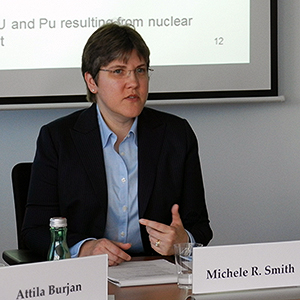

On 28 August 2014, the Vienna Center for Disarmament and Non-Proliferation (VCDNP) and the Verification Research, Training and Information Center (VERTIC) hosted a discussion titled "UK and U.S. Cooperation to Address Technical Challenges in Verification of Nuclear Disarmament," featuring Attila Burjan, Principal Specialist, Nuclear Arms Control Verification Research, AWE National Nuclear Security Programme, and Michele R. Smith, Office of Nonproliferation and International Security, U.S. Department of Energy’s National Nuclear Security Administration (DOE/NNSA).
The UK-U.S. cooperative program applies policy, technology and program expertise to develop and evaluate targeted approaches for transparent reductions and monitoring of nuclear warheads, fissile material and associated facilities for potential arms control and nonproliferation initiatives. The presentations covered highlights and lessons learned from over 10 years of cooperative activities.
Mr. Burjan discussed how the United Kingdom and United States developed a step-by-step co-operative path forward to address mutually beneficial collaboration in this area. He explained that early work explored the feasibility of allowing foreign nuclear weapons states access to sensitive nuclear facilities.
Issues explored included:
Mr. Burjan described two exercises conducted by the United Kingdom and United States in each other’s nuclear weapon facilities, one taking place at Burghfield in the United Kingdom in 2002 and one at Pantex in the United States in 2006. He explained that the exercises, which consisted of mock familiarization visits with foreign personnel touring each facility, provided a good starting point to explore key issues. The United Kingdom and United States found that managed access permits a degree of access into sensitive nuclear warhead facilities, and that a holistic approach is necessary, including technology and chain of custody development.

Mrs. Smith continued on to describe the progression of UK and U.S. cooperative activities. She described ongoing goals such as identifying and developing technologies and procedures to protect classified and sensitive information and increase monitoring confidence in warhead dismantlement. Mrs. Smith also described the implementation and findings of the UK and U.S. Monitored Dismantlement Exercise in 2011, where the United Kingdom and United States played two fictional nuclear weapons countries, and the country played by the United States monitored the dismantlement of a nuclear object in the country played by the United Kingdom. This exercise, in combination with previous activities, has shown that Nuclear Weapon States can collaborate successfully on sensitive technical disarmament and verification topics, but noting that such collaboration between the United Kingdom and the United States is enabled by the 1958 Mutual Defense Agreement. Mrs. Smith explained that well-managed technical cooperation can facilitate increased understanding for protecting sensitive information, as well as expanding the technical and procedural knowledge base for warhead dismantlement and transparency.
View slides from the presentation by Mr. Burjan and Mrs. Smith.
